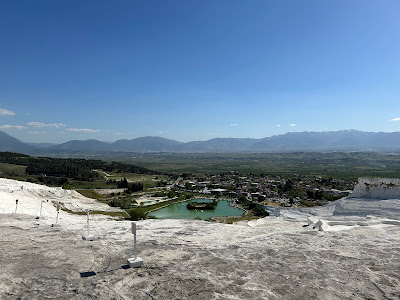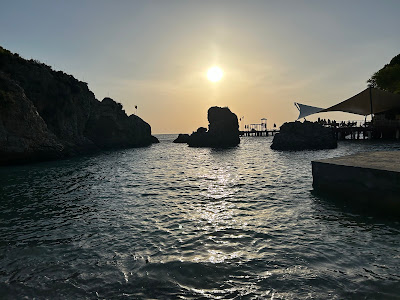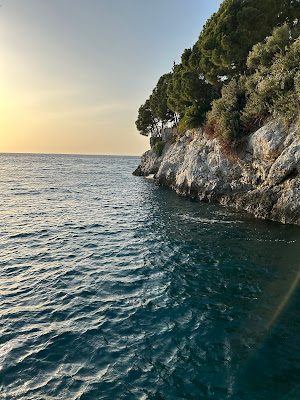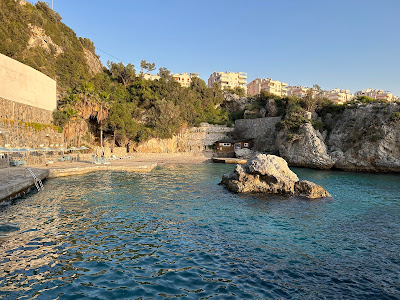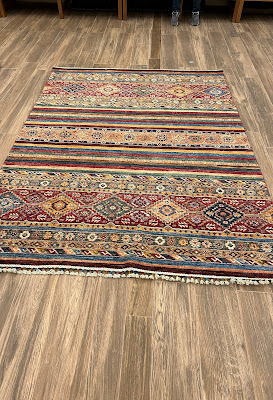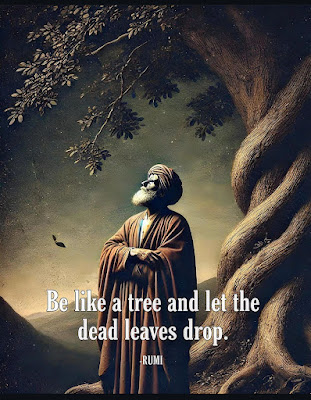Tuesday, November 12, 2024
2024 Turkey: Hierapolis (I)
Monday, November 11, 2024
Armistice Day 2024
Sunday, November 10, 2024
Saturday, November 09, 2024
Eulogy Of The Master Sergeant
(This was the eulogy I delivered for The Master Sergeant last week at his funeral)
Good morning.
On behalf of the Mr. and Mrs TB Families, we would like to thank you for being here with us this morning. Some made a journey to be here; all of you are deeply appreciated.
The Master Sergeant was one of three sets of twins and ten children total born to his parents in the Midwest. On growing up as a large household in <Midwestern states> he would share periodic stories, seemingly out of nowhere: capturing a raccoon, trips to the creek with his brothers, at least one Winter being so bad and so poor that they ate nothing but corn mush for most of it.
Upon graduating high school, he had two choices: to farm or to join the military. He joined the Air Force. His specialty was as an aircraft mechanic, something that was both a blessing and curse: a blessing in that it kept him largely in the US and for many years at Near Old Home, a curse in that it denied him the ability to perhaps have more postings elsewhere.
On a blind date, he met his wife the Future Mrs. Master Sergeant. Things went swimmingly and they were married . They had two daughters, The Ravishing Mrs. TB and The Ravishing Mrs. TB’s sister.
The Master Sergeant retired from the Air Force after 20 years. He and the now actual Mrs. Master Sergeant bought a house in Near Old Home at 1806 San Jose Place where they lived until his passing.
The Master Sergeant had several interests. He was a man of gardening and landscapes: his yard was always perfect, his garden full (his tomatoes remain amazing in my mind), and he built a backyard pergola and pond where he kept koi. He enjoyed fishing and for many years went on the bays and sloughs around Near Old Home. He enjoyed grilling and smoking and was an expert long before television chefs traveled long distances to find that “someone” no-one had heard of. And he was a long time coin collector, something that (from one of his brothers) had been a passion from when he was young.
Thus far The Master Sergeant the man. Now the harder part: The Master Sergeant as I knew him.
There is no manual for the meeting of your possible father in law and it is not something that young men seem to discuss among themselves: in that sense it remains very similar to the process that has been happening since before recorded history: one has a smattering of what your-then girlfriend tells you (and what they have told their father about you) and you go in, hoping against hope that things go well and your first meeting is not a mis-step of Biblical proportions.
Fortunately for me it was not: that I recall, things went pleasantly enough and I did not die. In retrospect I wonder what The Master Sergeant thought of that meeting: I was undoubtedly rather nervous and sweaty and probably stumbled a lot. He never held that first meeting against me that I know of, being as welcoming as a father can be to someone who is both dating and at some point possibly marrying his daughter.
I wrote of The Master Sergeant’s gardening skills: they stunned me. I had never seen someone do so much with a relatively small space and the citrus trees in his backyard were a marvel to me; many was the time I would come to visit, grab a chair, and sit out under the tree and read, surrounded by the fragrance of the blossoms and the sound of the waterfall he had built.
His grilling skills were something unlike anything I had seen either: we had barbecued growing up, what The Master Sergeant did was something else. It was easily ten years under his tutelage before I was “allowed” to grill ribs on my own – and even then it was under his strict supervision for another five. Another skill he held which left me in awe was his ability to tell what wrench I needed to use merely by looking at the bolt or nut instead of putting up a series of wrenches to it to see which one fit.
Otherworldly, I thought it. College kid without experience, he probably thought back.
I had never met a coin collector of any kind before The Master Sergeant. The most impressive thing to me about it was not the albums and albums he had of silver rounds and wooden rounds in bookcases and file cabinets, it was the number of contacts that he had throughout the U.S. of people with a similar interest. He knew people all over the U.S. long before social media and even cheap cell phone calls were thing, keeping in contact with them via letters and phone calls with exchanged coins and the typing up and sending out of newsletters that he did for more than one coin club. There were many time early in our marriage we would stop at their house and he would be in the back bedroom, working away on a typewriter for one of the various newsletters for which he effectively served as reporter, editor, and publisher.
Our relationship was set on a series of principles that, like that initial meeting, we never really discussed between each other but simply evolved the way these things seem to. Part of that was a realization that we were very different people with different backgrounds and different interests which are thrust together by a relationship that one chose and the other came along with. Our conversations tended to be of the safe sort that one has to pass the time: how work is going, college football (something I was not at all good at), some techniques at gardening or grilling. Once or twice I went with him to a coin show: he directed me to the vendors with the historical coins he thought I would enjoy
One thing I found in my relationship with my own father is that I did not understand the extent to which his early life impacted his later one. I suspect the same was true with The Master Sergeant. He could be cross sometimes, but then would buy you dinner or help you rebuild your retaining wall or support you financially. And the only time I can think of when we had a verbal disagreement, he never held against me later.
As time went on, two things came to dominate his life: his grandchildren and the diabetes which, in the end, took his life.
In his grandchildren, he took great joy. He managed to pass his love of fishing on to his grandsons. To all of five of his grandchildren he remained involved, although for our girls it became harder once we moved to New Home. Still, even then he loved to see them and speak with them on the phone about how things were going in their lives. He also had a stock of what are now known as “Dad jokes”, which he would roll out for them upon occasion.
In his diabetes, the skill that had worked for him to that point – commitment to not changing course until a thing was done – did not work as well. It becomes relatively easy to look back on someone in that position and wonder “Why can he not change?”; it is much harder to realize that the habits and skills that got one to that point can be very difficult to change or abandon.
The Master Sergeant’s religious beliefs were probably the most private thing about him and something that we (to my reckoning) never discussed more than once or twice. That he did not discuss them does not mean he did not hold them: sometimes those things that are most precious to us remain the most private. But private, of course, is different from not having them at all.
If I have a favorite memory of The Master Sergeant it is less of The Master Sergeant himself than of the atmosphere that he created: sitting under the lemon tree with the scented blossoms in full bloom, looking at a deep green well manicured garden with the water bubbling down the rocks and the smell of ribs cooking drifting by. And in this, perhaps, lies The Master Sergeant’s greatest gift to myself and really anyone who knew him: memories of things that both bring us the joy of who they were and what they did and the sorrow of the fact that, at least in body, they are no longer with us.
Friday, November 08, 2024
The Day After
I thought, as a post election note, to give a view of The Day After - because it was completely unremarkable from where I was.
There were no mass wailings or tears. There was no gloating or shouts " USA! USA!" filling the hallways. There was no post-election paraphernalia being worn or dangled from clothing or backpacks (everyone has a back here, I assume because rain is a thing so often).
The company put out a somewhat expected "Many of us are feeling stress and this is where to find support" e-mail - which was not a surprise to me in the least: it is a very large company and ticks all the current modern thinking boxes. But it was a restrained e-mail, not even mentioning why people were feeling stress (the election, of course), and so was pretty non-offensive.
What happened instead? People worked.
To be fair, it was the end of a manufacturing day and a 24 hour day at that, but none the less we had a task. People worked in the facility. People went to meetings.
People did their jobs.
For the rather large amount of wailing and cheering I have seen on the InterWeb, it was not indicative of my experience. For all one would have known, there simply was no election at all. And honestly, that is how it should work.
I am mulling over the non-political lessons of this election - I think there are several - but one of the biggest to me is simply the fact that I wonder if this election represents a potential turning point in our culture on the cult of attention. I have pondered on it before, this need to make everything about one's self to every extent possible - but in the post days after election the only people actually paying attention to such things were the ones publicly having breakdowns or the ones publicly gloating. Neither is particularly helpful of course: one election is not a reason to make one odious to one's friends or one's enemies.
If I have any wish over the next two months, it is that people simply move on with the work that needs to be done. I realize that is unrealistic of course, but public screaming sessions or public victory laps do not solve any of the rather large problems facing us as a country.
And that, at least for me, is what I care about. Solutions and getting things done. I saw that at my place of work The Day After. Would that all adults could actually act like adults and, as Steven Pressfield says, Do The Work.
Thursday, November 07, 2024
2024: House of Mary (And More Kuşadasi)
One of the lesser known (but still interesting) sites near the ancient city of Ephesus is the house of Mary.
One reaches the house by driving on the valley floor ....
Wednesday, November 06, 2024
2024 Turkey: Rug Factory
One of the things that the tour company we have used for all of our tours for the last four years does is make stops at "trusted partners". Part of it is to display local traditions and crafts (like, for example, the coffee plantation in Costa Rica or the Icon Factory and Olive Farm in Greece). I suspect there may also be some sort of "advantage" to the company to do this, or at least to its tour guides. I do not really mind: the stops have always been interesting, the pressure to purchase low, and it has really been a great way to see local practices and crafts.
In this case, it was a rug factory.
The undyed silk:
Tuesday, November 05, 2024
05 November 2024
Today's post, happening as it is on the quadrennial festivities that occur this time every November, owes its premise to that wily poster and man-about-town Eaton Rapids Joe, who in his own post of yesterday noted the fact that, in the midst of "The Season", he was brought to Matthew Chapter Six, where he notes that Christ dealt with four different things: fasting, performing acts of charity, and praying all in a manner to attract attention and praise rather than actually fast/be charitable/pray and our concern the wealth and planning for the future (he breaks into five sections; he is far better at this than I).
But the last portion of this chapter really came across to me this evening (the night before) beyond just the subjects of wealth and planning (after all, the Bible often speaks of such things):
"Therefore I say to you, do not worry about your life, what you will eat or what you will drink; nor about your body, what you will put on. Is not life more than food and the body more than clothing? Look at the birds of the air, for they neither sow nor reap nor gather into barns; yet your heavenly Father feeds them. Are you not of more value than they? Which of you by worrying can add one cubit to his stature?
So why do you worry about clothing? Consider the lilies of the field, how they grow: they neither toil nor spin; and yet I say to you that even Solomon in all his glory was not arrayed like one of these. Now if God so clothes the grass of the field, which today is, and tomorrow is thrown into the oven, will He not much more clothe you, O you of little faith?
Therefore do not worry, saying 'What shall we eat?' or 'What shall we drink?' or 'What shall we wear?' For your heavenly father knows that you need all these things. But seek first the kingdom of God and His righteousness, and all these things will be added to you. Therefore do no worry about tomorrow, for tomorrow will worry about its own things. Sufficient for the day is its own trouble." - Matthew 6: 25 - 34 (emphasis mine)
Yes, it is specific to worrying about food and clothing. But taken more generally - and there are more general applications elsewhere - the message is plain: we are to trust God, not worry about the outcome of things, especially things which are largely out of our control.
Pray? Yes, of course. But whatever the outcome, it will ultimately redound to God's glory. Which is the real purpose we should always strive for.
Monday, November 04, 2024
Be Like A Tree
Sunday, November 03, 2024
Saturday, November 02, 2024
Friday, November 01, 2024
A Recipe Book Of Memories
(An update on my Aunt: Apparently she has two tumors, one in her duodenum and one in her pancreas. The hope is that they are two separate cancers in their early stages instead of Stage 4 pancreatic cancer which has metastasized. Thank you for your kind thoughts and prayers.)
This past weekend Nighean Bhan sent me a text: Could I find Grandma's recipe for meatloaf in the church cookbook?
"Grandma's meatloaf recipe" is really my maternal grandmother's recipe (so really "Great Grandma's meatloaf recipe", I suppose). It may something between 80 and 90 years old at this point or even older, a Depression-era recipe that was easy to make and used a minimum of ingredients. It remains one of my personal comfort foods, a thing I associate with family dinners at home on cold nights. It was always a treat when we had it.
Not even being conscious that we had such a recipe - I still picture all such recipes on recipe cards - I rifled through the collection of cookbooks on our shelves - a combination of "365 ways to prepare X", fancy specialized cookbooks, and the random sorts of cookbooks that show up over the course of a lifetime of children, food festivals, and random cuisines that catch your eye. Sure enough, just as Nighean Bhan had said, there was the cookbook: "The Joy of Sharing: Old Home Lutheran Church.
The cover was a hand drawn pictures likely drawn by someone in the congregation, the binding spiral bound, the whole thing put together by a fund raising organization. The sections were organized into the typical sorts of recipes: Appetizers, Soups/Salads, Sauces, Meats & Main Dishes, etc. etc. "Meats and Main Dishes" sounded pretty promising.
Going to that section, I was initially annoyed by the fact that the recipes were all out of alphabetical order (and, there was not index). So I started wandering through, scanning from page to page for something that said "Meat Loaf".
And then I started to look more closely. At the bottom of each recipe was a name.
I knew many of these names - they were mostly people that would have been in their 50's and 60's at the time this was published, about the generation of my parents. Lots of them - mostly women - were faces that I could picture as soon as I saw them. My second grade teacher was there, as was her aide. At least two pastors and their wives. The guy that lead my youth group. Numerous church friends of my parents.
Suddenly this was less of a recipe book and more of a time capsule to a place and people long ago.
Most of the folks in this cookbook are now passed on, like my parents, enjoying a far greater Feast in another place. A few still linger here, faint remnants of my own life long ago.
Part of me wonders if they still make cookbooks like this or, like the church directories that we sat for pictures against beige backgrounds, they have passed out of common practice due to cost, technology, mobility and privacy concerns. That is a bit of a pity, honestly: yes, the recipes are not always adaptable to today (I have no idea what a "pretzel salad" is, but it sounds very much 1950's), but the memories and the comradery and the homeliness (in the best sense) that such things represent truly do seem like some of another age, the likes of which we will not see again.
Bonus Round: The recipe:
Grandma's Meat Loaf
1 1/2 lbs ground meat
1 medium onion, chopped
1 1/4 tsp poultry seasoning
1 tsp salt
1 egg
3 slice bread, torn in pieces
Pepper to taste
Milk to moisten (canned milk, undiluted)
Mix together well. Put in greased loaf pan and draw lines on the top, filling them with catsup. Bake at 350 F for about 1 hours. Meat loaf draws away from the pan when done.
Toirdhealbheach Beucail's Addendum: Best served with new potatoes which have been sliced, put in a pan, had butter added over them with salt and pepper, and baked. Add additional ketchup as needed. Green items could appear as a side dish, but are not required.












